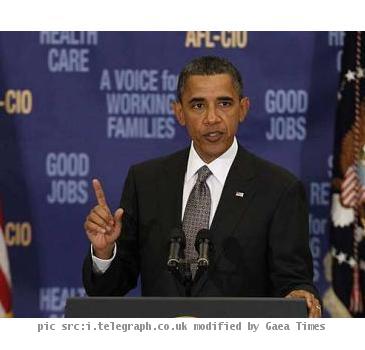2 straight governors convicted of felonies _ what went wrong in Illinois?
By Christopher Wills, APSunday, August 29, 2010
2 governors, 2 crooks. What’s wrong with Illinois?
SPRINGFIELD, Ill. — Two Illinois governors from two different parties, two generations, two regions of the state. Both convicted of felonies.
Is there something about Illinois that encourages governors to go bad? Or is it just coincidence that two in a row have ended up as criminals?
A jury convicted Rod Blagojevich of lying to federal investigators about mixing political fundraising with his government work, but deadlocked on whether his other actions crossed the line into corruption. That should be resolved early next year, when the former governor faces a second trial.
Still, his troubles share a common denominator with those of already-imprisoned George Ryan: access to a river of political money. Illinois law let them accept any amount from any donor, including people who had something to gain from a friendly governor. The two also have something else in common — Illinois voters put them in office despite serious questions about their honesty.
Hoping to prevent future governors from going astray, reform advocates pushed through laws restricting political donations, though loopholes remain. Whether voters will change their habits is still in question.
“I sure hope the voters of Illinois will try to do their homework a little better next time,” said Brad McMillan, executive director of Bradley University’s Institute for Principled Leadership in Public Service. “Corruption and lack of ethics, in my opinion, isn’t the No. 1 problem. It’s apathy.”
The Blagojevich trials will do little to improve Illinois’ reputation as one of the most politically crooked places in America. McMillan, who served on a state ethics commission in the wake of Blagojevich’s impeachment, said too many Illinois voters and politicians simply accept a certain level of corruption.
Blagojevich was convicted only of lying about how deeply he was involved in his political fundraising operation. But few who heard the FBI recordings of his conversations could avoid concluding that he mingled government and politics in unsavory, if not necessarily criminal, ways.
In the retrial, jurors may again hear evidence of how Blagojevich allegedly delayed government help to a children’s hospital executive, a racetrack owner and road builders while telling aides to pressure them for donations. Jurors will also likely be deciding whether Blagojevich committed a crime by discussing ways he could benefit, financially and politically, from his power to appoint Barack Obama’s Senate replacement.
Blagojevich was the sixth Illinois governor to be indicted since the 1920s, including one accused of bank fraud after leaving office. Of the last seven men elected governor, four have been convicted of felonies. Countless other state and local officials got caught, too.
Some suspect that sorry history of corruption began with the hustler spirit of the state’s settlers. And later, as waves of newcomers arrived, officeholders sought to help them with government services and jobs in exchange for their money and political support.
Ryan, a Kankakee Republican, was a 64-year-old veteran of Illinois politics when he ran for governor. He won despite a reputation as a master of backroom deals and the fact that federal investigators were looking into widespread corruption during his two terms as secretary of state.
Blagojevich, a Chicago Democrat, was a little-known 46-year old congressman when he ran to replace Ryan. By the time he ran for a second term, he had been the subject of endless ugly headlines, and prosecutors had said they had evidence of serious wrongdoing. He was elected anyway.
Ryan was convicted of turning his government offices into little more than divisions of his fundraising machine. He steered state contracts to friends and donors, used campaign money to pay relatives and cover personal expenses, and accepted money, gifts and loans in return for official actions.
Blagojevich did much the same but on a larger scale, prosecutors argued. “George Ryan on steroids,” said David Morrison, associate director of the Illinois Campaign for Political Reform.
But officials are now barred from accepting donations from people with major state contracts. In other words, future governors can’t demand money from people or companies doing business with the state.
And the size of donations has been capped at $5,000 from individuals and $10,000 from corporations. That rules out the donations of $50,000 and $100,000 that Blagojevich often sought.
“I think we have passed a couple of laws that would make it much harder for someone like George Ryan or Rod Blagojevich to do that again,” said Morrison.
There are still weaknesses in the law.
Disclosure forms officials are required to fill out reveal next to nothing about their finances, Morrison points out, and large fees paid to lobbyists, which played a role in both the Ryan and Blagojevich scandals, are a mystery to the public.
McMillan notes that political parties can still make unlimited donations to candidates. And of course, there’s still the possibility of out-and-out bribery — envelopes full of cash exchanged in secret.
The man who succeeded Blagojevich as governor, Pat Quinn, has supported stronger ethics laws while also agreeing to compromises that dismayed some reform advocates. There will surely be more pushes on ethics rules, but Morrison said laws alone can’t solve Illinois’ problems.
“The statute books are just ink on paper,” Morrison said. “What that ink on paper does is create a system in which, hopefully, good people can thrive and it’s harder for bad people to succeed.”
Tags: Barack Obama, Campaigns, Illinois, North America, Political Corruption, Political Ethics, Political Fundraising, Political Issues, Springfield, United States

